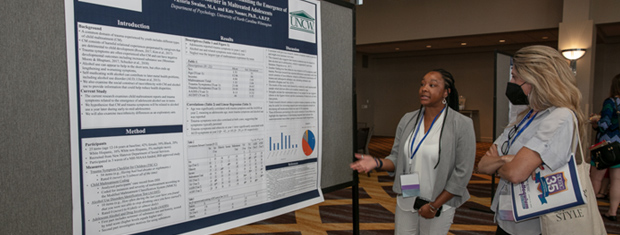




The APSAC Advisor is a peer reviewed quarterly news journal for professionals in the field of child abuse and neglect.
The APSAC Advisor provides succinct, data-based, practice-oriented articles that keep interdisciplinary professionals
informed of the latest developments in policy and practice the field of child maltreatment. It is designed to highlight
best practices in the field and publish original articles and current information about child maltreatment for professionals
from a variety of backgrounds including medicine, law, law enforcement, social work, child protective services, psychology,
public health and prevention in the U.S.
 If you wish to learn more about submitting an article to the Advisor, please click here.
If you wish to learn more about submitting an article to the Advisor, please click here.
This library contains Advisor issues dating back to the first issue in 1988. The most recent issue appears at the top.
Scroll down to select past issues by year and issue number. Once a publication appears in the box, you
can use the Enlarge button to open the document in a new window or tab (depending on how your browser is set up).
This will allow you to view the document with larger print.
To print a document, first use the Enlarge button to open the document in a new window or tab. Then use your browser's Print command.
To return here from a new tab, close the tab. To return from a new window, click your browser's Back button.
In the listing below, click on a year and issue number to see the articles in that publication.
2018 Number 1
Introduction to the special issue.
Munchausen by Proxy Clinical and Case Management Guidance
These Guidelines reflect current knowledge about best practices related to the identification, reporting, assessment, and management of Munchausen by proxy (defined here as "Abuse by pediatric condition falsification, caregiver-fabricated illness in a child, or medical child abuse that occurs due to a specific form of psychopathology in the abuser called factitious disorder imposed on another").
Abuse by pediatric condition falsification/ caregiver-fabricated illness in a child/ medical child abuse (APCF/CFIC/MCA) is a perplexing phenomenon frequently going undetected until an astute observer first challenges the illness presentation. Any illness or condition can be falsified by simply providing inaccurate information, while simulation and/or induction of illness can be particularly challenging to uncover. The following table, which is a companion article to the 2017 “APSAC Practice Guidelines on Munchausen by Proxy,” summarizes a variety of ways that illnesses may be simulated or induced. This is not an exhaustive list of all the possible presentations of APCF/CFIC/MCA or means of simulation and induction, but can be utilized as a starting point.
Investigation of Factitious Disorder Imposed on Another or Medical Child Abuse
Investigating medical child abuse, or any other fabricated condition in a child, presents many challenges beyond the realm of typical physical child abuse evidence collection. This article uses several high-profile legal prosecutions to illustrate the importance of early involvement of law enforcement personnel who are knowledgeable about this unusual presentation. The importance of specific interviewing techniques, crime-scene investigation in both the hospital and the home, social media, and computer evidence collection are described. Examples of successful practices in Tarrant County, Texas, provide guidance for effective interdisciplinary team collaboration among physicians, child protective service workers, prosecutors, law enforcement, and therapists. Offenders are typically very convincing and comfortable lying to doctors, family members, and psychiatric evaluators. The proper tools for investigating medical child abuse are evidence based and follow the Practice Guidelines.
Munchausen by Proxy in Educational and Mental Health Settings
Falsified behavioral problems and developmental delays are commonly documented in the literature, but victims of Munchausen by proxy (MBP) presenting in educational and/or mental health settings are challenging to detect. Because teachers, school nurses, and mental health professionals typically see children more frequently than pediatricians, they are in an ideal position to identify possible MBP abuse and neglect, especially falsified learning, developmental, psychiatric, and behavioral problems. Debilitating long-term negative consequences have been associated with thwarted developmental milestones, developmentally inappropriate socialization, incorrect self-perceptions of ability and functioning, and iatrogenic harm from medications designed to treat behavioral disorders. This article serves as a complementary guide to the 2017 “APSAC Practice Guidelines on Munchausen by Proxy” for school and mental health professionals.
Munchausen by Proxy Risk Assessment, Support, and Treatment of Spouses and Other Family Caregivers
Spouses of Munchausen by proxy (MBP) abusers and other family caregivers are frequently considered for possible placement or visit supervision for the child victim, or both. They require careful evaluation to insure the child does not continue to be victimized. The purpose of this article is to provide assessment suggestions as well as support and treatment considerations. The ultimate outcome for the child will depend not only on protection from the abuser but also the ability of caregivers to provide realistic support for health and wellness. For questions regarding this article, please contact Mary J. Sanders, PhD, sand@stanford.edu, or Catherine C. Ayoub, RN, EdD. Catherine.Ayoub@childrens.harvard.edu.
Child Protective Services Management of Cases of Suspected Child Abuse
Due to the compulsive, pervasive, and insidious nature of this form of psychopathology, management of cases of abuse or neglect by a caregiver with factitious disorder imposed on another (FDIA) must be detailed and comprehensive to ensure safety. Most notably, individuals with FDIA can be highly skilled in misleading and convincing intelligent others that they are being truthful. As a companion to the 2017 “APSAC Practice Guidelines on Munchausen by Proxy,” this article provides child protective services professionals with detailed information on the effective management of suspected child abuse or neglect by a caregiver with FDIA, including guidance for interactions with the suspected abuser, placement decisions, case management, treatment planning, visitation, reunification, evaluation of progress in psychotherapy, and transition home.
The Influence of Electronic and Internet Advances on Munchausen by Proxy
The advent of WebMD, online communities, and blogs provide unprecedented access to medical information and online communities for people suffering with diseases. Social media platforms allow people to share any personal information, photos, and stories they choose to post. This article examines the positive aspects of technology to aid in detection, provide evidence of deception, and even conduct research, along with the ways the Internet has fueled or created venues for potential perpetrators to access medical knowledge, share information about a sick child, and receive social and monetary support. The authors also discuss how the Internet has provided forums for suspected perpetrators to organize against medical diagnoses and child protection, and they explore the influence of electronic medical records and online consumer satisfaction surveys on clinicians and on parents who might engage in fabricating illness in a child.
APSAC Advisor 30(1): Full issue